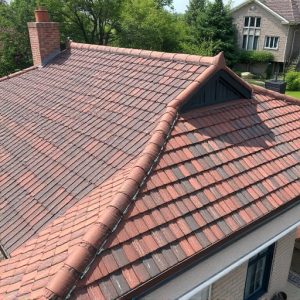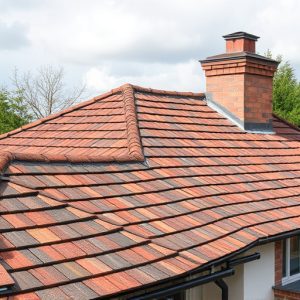Maximizing Home Protection: A Guide to Roofing Warranties for Satisfied Homeowners
When investing in roofing services, understanding the warranty options available is paramount for ho…….

When investing in roofing services, understanding the warranty options available is paramount for homeowners seeking long-term satisfaction and protection. This article delves into the nuances of roofing warranties, from manufacturer’s to workmanship guarantees, ensuring you are well-equipped to make informed decisions. We explore various types of warranties, their coverage, and how they safeguard your investment. With actionable insights on claiming your warranty and tips for maximizing its benefits, this guide aims to provide a robust framework for peace of mind in your roofing endeavors. Roofing warranties are not just contracts; they are assurances of quality and durability that can save you from unforeseen expenses in the future.
- Understanding Roofing Warranties: A Comprehensive Guide for Homeowners
- Types of Roofing Warranties and What They Cover
- The Importance of Manufacturer’s Warranty in Roofing Services
- Evaluating the Workmanship Warranty in Roof Installation Projects
- How to Claim Your Roofing Warranty: Step-by-Step Guide
- Maximizing Satisfaction with Your Roofing Warranty: Tips and Best Practices
Understanding Roofing Warranties: A Comprehensive Guide for Homeowners

When it comes to protecting one of your home’s most critical components, understanding roofing warranties is paramount for homeowners. A well-maintained roof not only shields your family and possessions from the elements but also safeguards your investment in your property. Roofing warranties are contracts between the homeowner and the contractor or manufacturer that outline the coverage and terms for repair, replacement, or maintenance services. These warranties can be complex, with different types covering various aspects of roof construction, such as materials, labor, and workmanship. It’s crucial to read and comprehend the fine print, as warranties can vary significantly in scope and duration. Typically, material warranties may last up to 50 years, depending on the manufacturer, while labor warranties often extend for a shorter period, ranging from one to ten years. Homeowners must also consider that warranty coverage can be voided by improper installation or neglect over time. Therefore, selecting a reputable roofing contractor with a history of honoring their commitments is essential. Additionally, maintaining proper documentation and adhering to the warranty’s terms will ensure homeowners can take full advantage of the protections offered, should any issues arise with their roofing system. Understanding the intricacies of roofing warranties, including what they cover, for how long, and the conditions that must be met to invoke them, is a critical step in ensuring satisfaction and protection for your home’s most vital shield.
Types of Roofing Warranties and What They Cover

When it comes to roofing warranties, understanding the different types and what they cover is crucial for homeowners seeking long-term satisfaction with their roofing systems. There are primarily two types of warranty options in roofing: material and workmanship. A material warranty, often provided by the manufacturer, covers defects in the materials used for the roof, such as shingles or flashing, for a specified period. This type of warranty typically ranges from 20 to 50 years, depending on the product. On the other hand, a workmanship warranty is offered by the contractor and guarantees the quality of installation for a shorter duration, often one to five years. It’s important to ensure that both types of warranties are in place before any roofing project begins, as they offer protection against manufacturing defects and installation errors that could compromise the integrity of your roof over time. Additionally, some warranties may be void if certain maintenance practices aren’t followed, so it’s essential to discuss these responsibilities with your contractor to maintain coverage. Understanding the intricacies of these warranties can provide peace of mind, knowing that your investment in roofing is safeguarded against unforeseen issues, ensuring satisfaction for years to come. Roofing systems are significant investments, and warranties play a pivotal role in protecting that investment by providing a safety net against potential problems, thereby enhancing the longevity and performance of the roof.
The Importance of Manufacturer’s Warranty in Roofing Services

When investing in roofing services, the manufacturer’s warranty plays a pivotal role in safeguarding your investment. It provides assurance that the materials used for your roof are of high quality and are designed to perform as intended over time. A robust warranty from a reputable manufacturer can offer peace of mind, knowing that should any issues arise due to defects in materials or workmanship, you have recourse. This is particularly crucial given the exposure to the elements that roofing systems endure, such as wind, rain, snow, and sun, which can all lead to wear and tear over the years. Homeowners must pay close attention to the terms of the warranty, including what it covers, for how long, and any conditions or stipulations that must be met to invoke the warranty’s protection. Understanding the manufacturer’s warranty is essential in roofing services as it directly impacts satisfaction with the roof installation or repair. It can save homeowners from costly repairs down the line and is a testament to the manufacturer’s confidence in their products. When selecting a roofer, ensure they are well-versed in the warranty options available and can guide you through the process of securing a comprehensive warranty that aligns with your specific needs and expectations for your roofing system.
Evaluating the Workmanship Warranty in Roof Installation Projects

When engaging in a roof installation project, evaluating the workmanship warranty is paramount to ensure long-term satisfaction and protection against potential issues. A robust workmanship warranty from reputable roofing contractors not only attests to their confidence in their craftsmanship but also provides homeowners with peace of mind. This warranty typically covers defects in workmanship for a specified duration, distinct from material warranties offered by manufacturers. Homeowners should inspect the terms and conditions of the warranty carefully to understand what is covered, the duration of coverage, and any exclusions or stipulations that might affect claims. It’s crucial to ensure that the warranty aligns with industry standards and offers comprehensive protection against common issues like leaks or improper installation, which can be costly and disruptive to rectify after the fact. Engaging with roofing contractors who provide clear and detailed workmanship warranties is a sign of their commitment to quality and customer satisfaction. Homeowners must also maintain proper records of all maintenance and repairs performed on their roof to preserve the validity of the warranty should any post-installation problems arise.
How to Claim Your Roofing Warranty: Step-by-Step Guide

When a warranty accompanies roofing services, it offers peace of mind that any issues with craftsmanship or materials will be addressed within a specified timeframe. To ensure satisfaction and a seamless claim process, it’s crucial to understand the terms of your warranty and the steps required to make a claim. Firstly, keep all documentation related to your roofing project, including the contract, warranty information, and receipts. Should you encounter an issue covered under the warranty, promptly notify the roofing company. They will typically ask for detailed information about the problem, which may include photographs or a written description. Next, schedule an appointment for an inspection. During this visit, the roofer will assess the issue, confirm its coverage under the warranty, and discuss potential solutions. Ensure that you are present during the inspection to provide input and agree on the proposed resolution. If the warranty claim is approved, the roofing contractor will carry out the necessary repairs or replacements without additional cost to you. Throughout this process, communication is key; maintain clear records of all interactions with the contractor, including correspondence and repair details. By following these steps and understanding your warranty’s conditions, you can navigate any future issues with confidence and ensure that your roofing investment remains protected over time.
Maximizing Satisfaction with Your Roofing Warranty: Tips and Best Practices

When it comes to maximizing satisfaction with your roofing warranty, understanding the terms and conditions is paramount. Homeowners should thoroughly read and comprehend their warranty documents upon receiving them. This due diligence ensures clarity on what is covered, for how long, and under what circumstances repairs or replacements will be made. It’s not just about having a warranty; it’s about utilizing it effectively. Regular maintenance records can serve as valuable documentation should you need to make a claim. These records can demonstrate that you have taken care of your roof, which is often a condition for warranty coverage. Additionally, keep all correspondence and receipts related to your roofing system, as these may be required during the claims process.
To further enhance satisfaction with your roofing warranty, engage proactively with your roofing contractor or manufacturer. Establishing a good relationship can facilitate better communication and support when issues arise. Be sure to install only high-quality materials that come with a robust warranty from reputable manufacturers. This reduces the likelihood of premature wear or damage that might invalidate your coverage. Also, stay informed about any changes to the warranty terms over time, as these can affect your rights and responsibilities. By maintaining your roof diligently, understanding your warranty’s nuances, and communicating effectively with providers, you can ensure a more satisfying experience with your roofing warranty. This proactive approach not only safeguards your investment but also provides peace of mind for the longevity of your roof.







